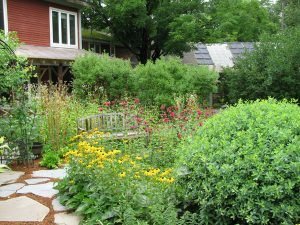Pollinators are key to plant reproduction, which yields the fruits, vegetables, flowers, and seeds that sustain our diets. Some pollinators are generalists, transferring pollen among many plant species, while others are specialists, relying on specific plants—and vice versa. These specialized relationships are fragile, especially in small geographic areas. That’s why native plants are crucial to New Hampshire’s ecosystems.
New Hampshire is home to over 200 species of bees, 130 species of butterflies, thousands of other pollinating insects, and the beloved ruby-throated hummingbird. By supporting native plants, we help sustain the entire food web that depends on these pollinator interactions.


